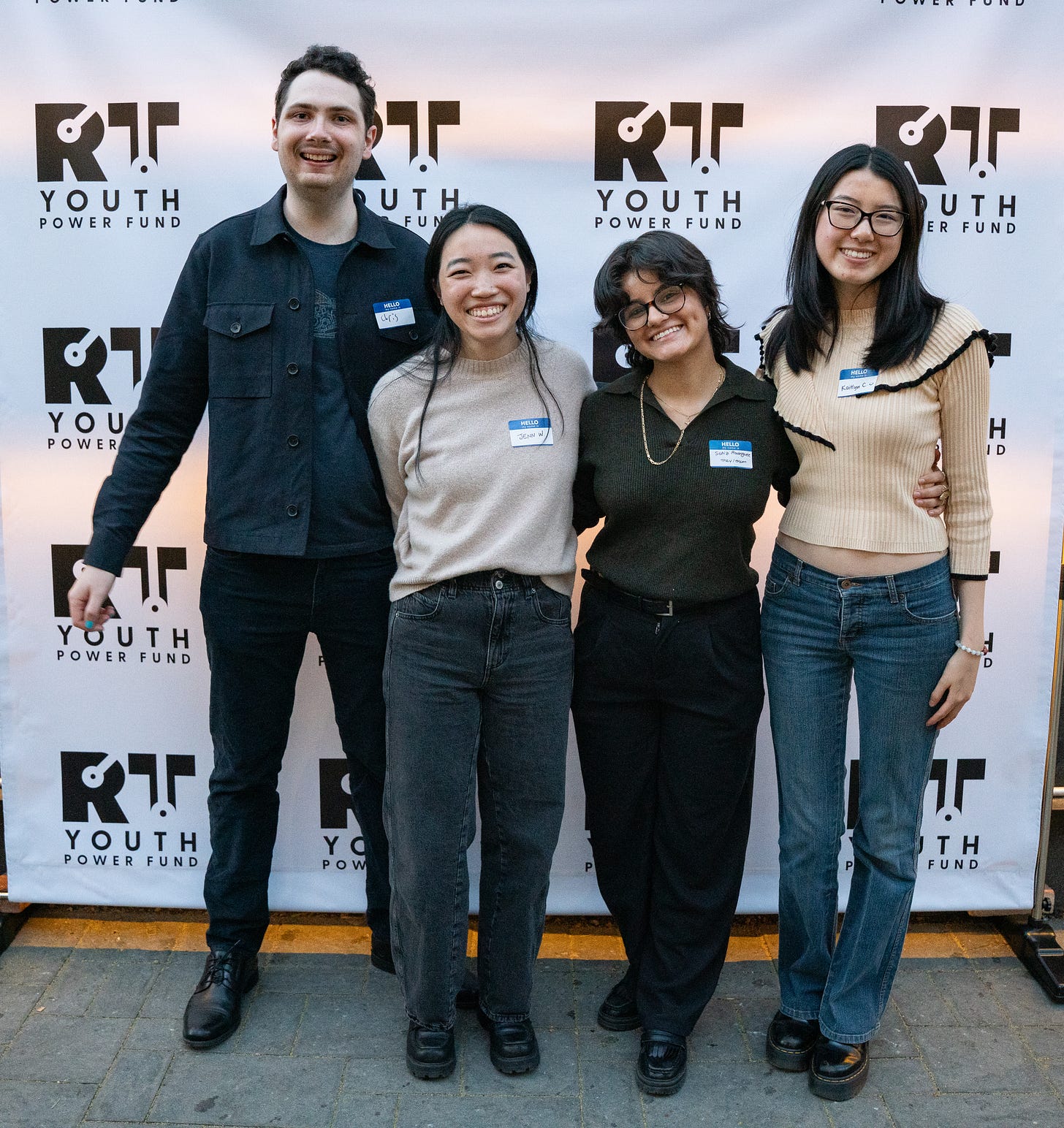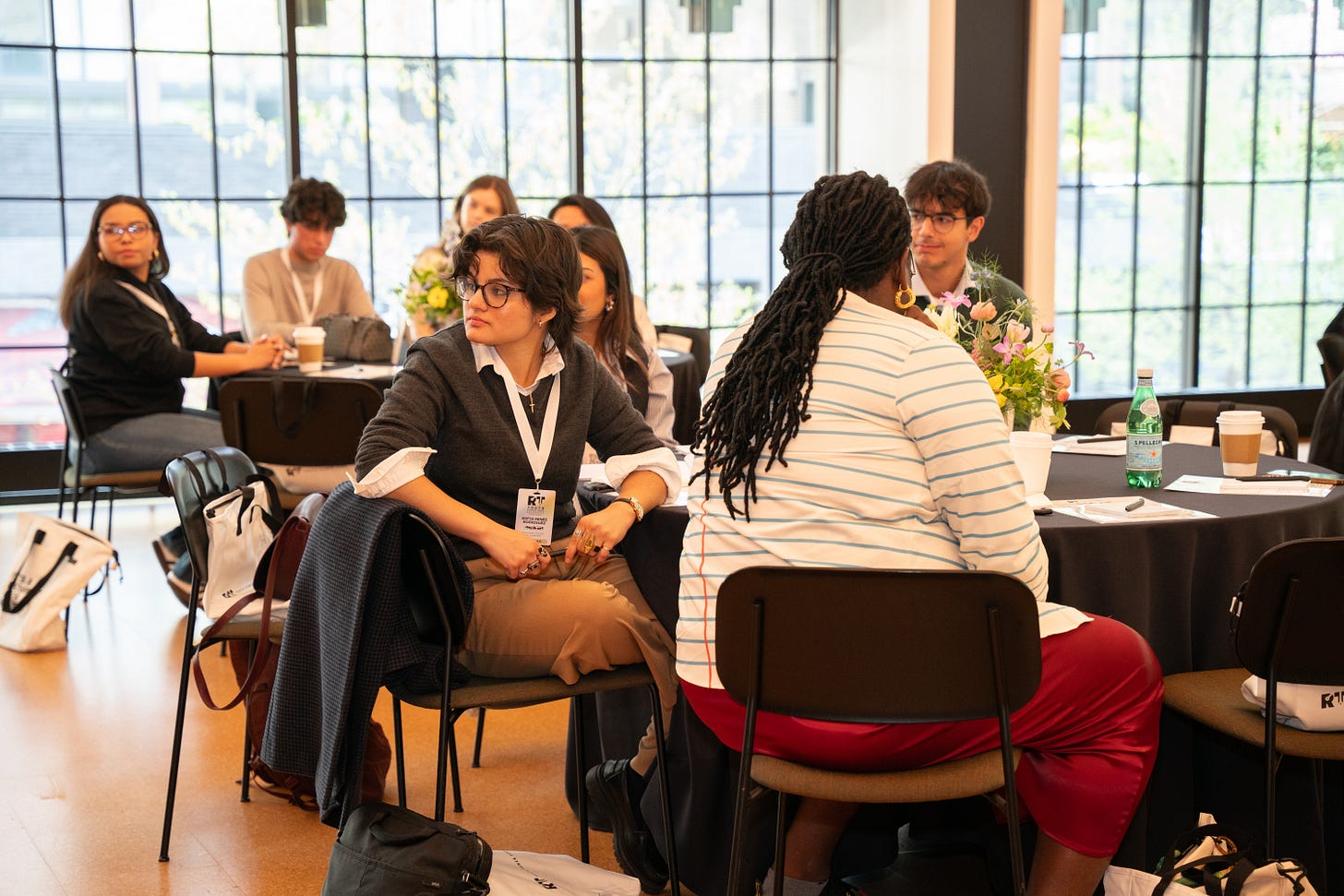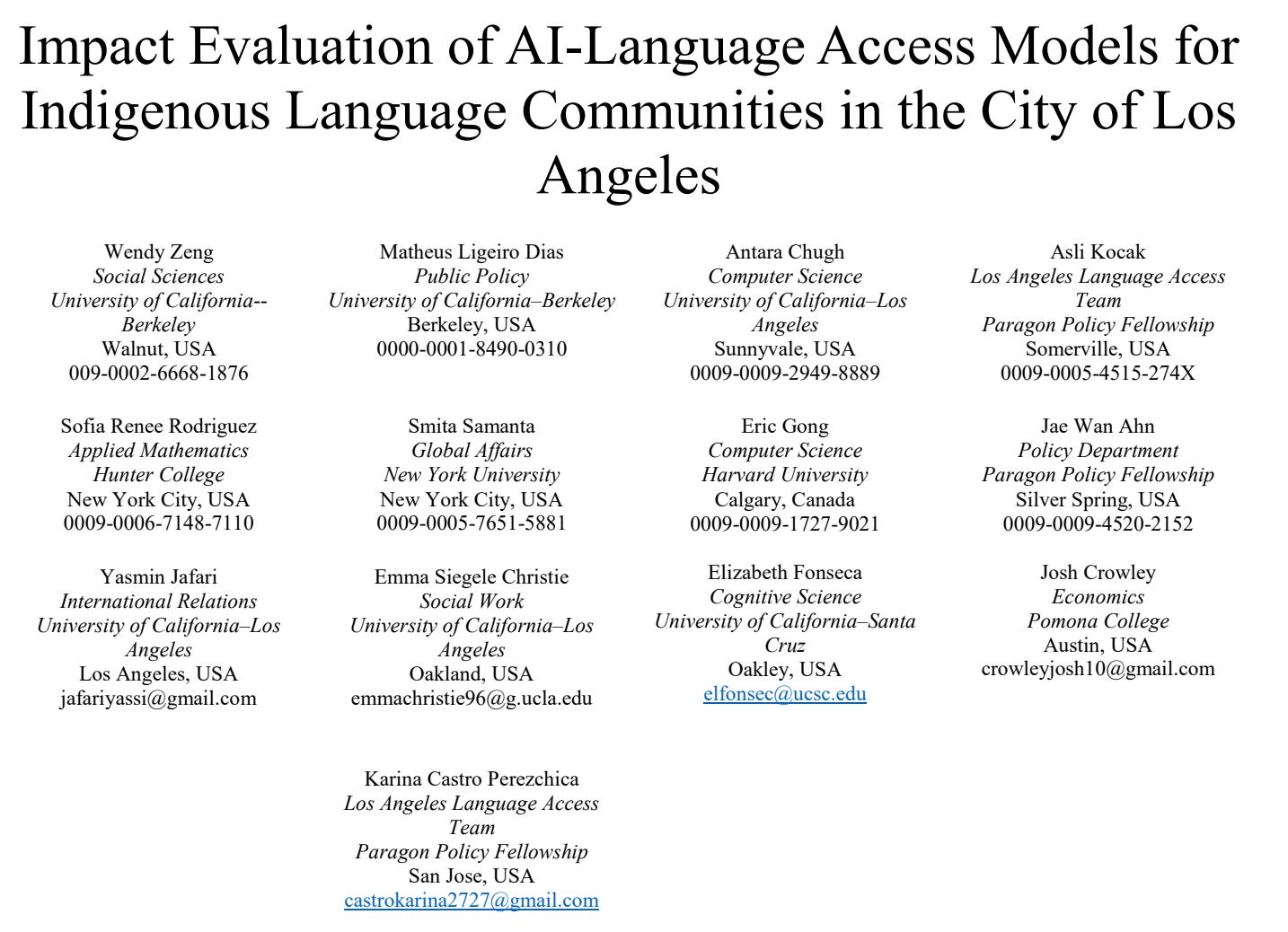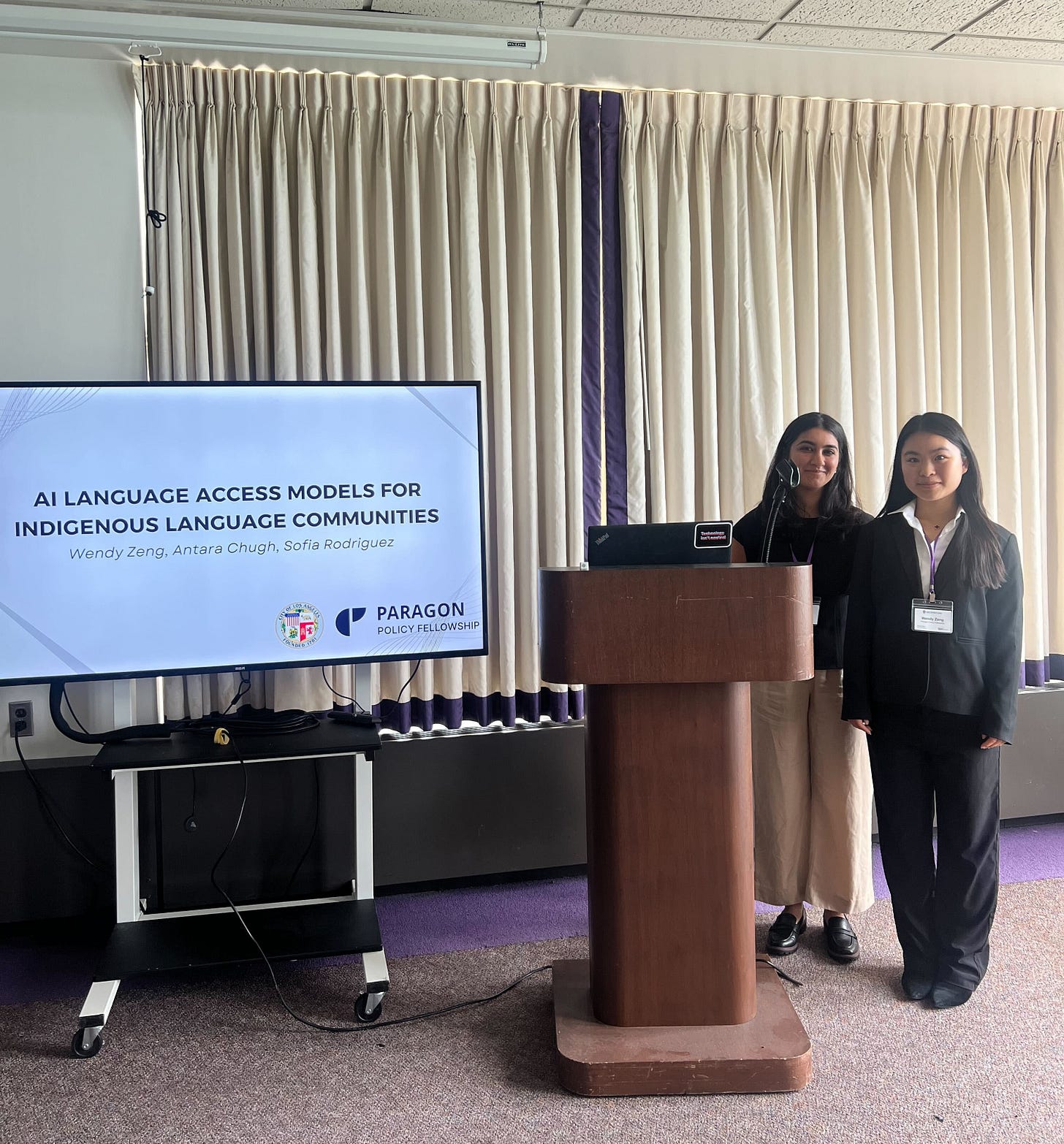Spring into Summer
RTYPF recap, mentorship program launch, and fellow conference presentations
Welcome to the Summer edition of the Paragon Policy Fellowship newsletter! As Paragon’s spring cohort has ended along with school, here is what the Fellows and Organizing Team have been up to:
RTYPF Recap
A Review of Spring Projects
Introducing Summer Projects
Mentorship Program Announcement
Los Angeles Fellows Present Research at IEEE ETHICS-2025
Fellow Spotlights
Tech Policy Reading List
Reflections on the Responsible Tech Youth Power Fund Convening 📅

In late April, Paragon’s 3 Executive Directors Kaitlyn Cui, Sofia Rodriguez, and Christopher Asma joined co-founder Jennifer Wang in New York City to attend the 2025 Responsible Tech Youth Power Fund (RTYPF). As one of 18 youth-led initiatives selected for Cohort 2, Paragon received a $67,000 grant to fund Fellowship stipends and scale organizational operations.
Since being selected for the grant at the start of 2025, Paragon has successfully run another 12-week spring cohort with 50 Fellows and 8 government partners. The Fellowship has also received 400+ applications and kicked off our Summer cohort featuring a new set of guest speakers, the launch of an alumni mentorship program, and a newly standardized cohort curriculum with a community-engaged research workshop. Below are reflections from the 3 Executive Directors about the convening:
In two jam-packed days, the RTYPF convening allowed us to connect with other youth as initiative leaders and as people. We were given a crash course on sustaining and scaling community impact in the technology governance space. We also exchanged ideas with organizations like Design It For Us, Encode, and Cyber Collective through programming such as media workshops with the Evergreen Strategy Group, a Q&A with funders, and group problem-solving sessions about the scalability and sustainability of our initiatives.
A recurring theme throughout the convening seemed to be the present and future uncertainty amidst the current political climate. Paragon’s operations have been directly affected, as a spring government partner project on community broadband access was terminated after abrupt federal funding cuts.
Similarly, these unpredictable budget cuts have impacted the funding and initiative scope for civil society. But as we continued talking with granters and grantees, we realized the connections we were cultivating through RTYPF allowed us to reimagine barriers and stalled projects as shared ventures, using constraints as a catalyst for deeper partnership and innovation.
On Day 2, the opportunity to attend the Archewell Foundation and Parents’ Network’s Lost Screen Memorial humanized the impact of sustained technology governance advocacy. What began as a group of parents who lost their children to social media harms was able to directly reach Meta, organize public demonstrations, and file a lawsuit through sustained community involvement and organizing. As youth leaders, we are so often focused on the future—future projects, future partnerships, and the future of our organization—that we forget to look at the communities we have already made.
Already halfway through 2025, we have plans for multiple initiatives to continue growing Paragon:
Increase our cohort size to match growing interest in responsible technology, prioritizing outreach to Minority Serving Institutions and students from geographically underrepresented communities. We hope to have recruited fellows from all 50 states and all US territories within 2 years and to have had a project in each of the 50 states within 5 years.
Publish our Tech Policy Playbook backed by a $90,000 grant from PIT-UN. The playbook includes institutional knowledge and program-building advice for other youth and youth-centered organizations interested in launching their own technology policy education programs.
Strengthen our policy curriculum offerings. Paragon already offers a 2-day policy bootcamp and 5 skills workshops throughout the Fellowship, but we hope to bolster these offerings by developing an additional community engagement workshop and accompanying syllabi with readings and activities.
Foster career development by building out our alumni programs and networks to support our fellows. We hope to build on our newly launched tech policy mentorship program by offering further mentorship, career support resources, and other opportunities.
Paragon’s growing initiatives would not be possible without the Responsible Tech Youth Power Funds’ grant and community-building resources. We are excited to join other organizations in co-creating a future of responsible technological innovation driven by youth perspectives!
Read more about the convening in this TechCrunch article.

Revisiting our Spring 2025 Cohort 🌷
Last month, the Spring cohort submitted their final deliverables and government partner presentations. The combination of peer collaboration on projects with direct community impact provided Fellows the unparalleled opportunity for personal and career growth. Read on to learn about the projects:
County of Santa Clara, CA - AI Risk Assessment Framework📚: For many County employees, AI is one of the most exciting technologies currently available, and they have been eager to propose using it for their work. However, there is limited understanding about the risks of using emerging AI when dealing with sensitive government data. Fellows developed a risk assessment framework to inform County officials of the potential risks of any new proposed AI use cases, allowing them to think critically before approving or rejecting the request.
City of Tempe, AZ - Data Curriculum 📖: In Fall 2024, Paragon assisted the City of Tempe with designing a curriculum on how City employees should be utilizing AI. In Spring 2025, the Fellows built on that work to develop a curriculum for employees on how to properly think about and use data. Fellows developed modules focused on 1) an introduction to the concept of data, 2) data visualization and management strategies, 3) ethical data usage and data risk, and 4) Tempe’s existing data policies.
City of Albuquerque, NM - Preliminary AI Guidelines 📋: In October 2024, Albuquerque’s City Council approved the development of an AI working group tasked with proposing a municipal AI policy framework. This working group is responsible for deliverables such as establishing an AI mission statement, a code of ethics, and a community engagement plan. Fellows assisted the working group by informing them of current AI municipal applications and internal practices and recommending which ones best suited the City. In addition, they provided a glossary of AI terminology and an analysis of AI risks to support the working group’s initial policy proposals.
City of Missoula, MT - WWC Data Management Certification 📊: The City of Missoula aims to be the first city in the State of Montana to be What Works Cities certified. WWC certification is given to cities that follow best practices in how to organize a government. One component of this certification is data management, ensuring that the City is handling its data optimally. Fellows worked to provide a roadmap for how Missoula could hit two of its WWC requirements for Data Sharing (DM3) and Data Privacy (DM5).
State of Montana - IT Funding 💸: The State of Montana currently has a decentralized IT system, meaning that every department has its own IT unit. This leads to inefficiencies as the central IT unit (Montana SITSD) must coordinate with these disparate IT units and is too small to benefit from the advantages of larger IT departments, such as making bulk purchases. Montana Fellows dived deep into different IT funding structures across the country and not only provided research on the benefits of a centralized IT system but prepared recommendations for how Montana could centralize its IT system as well.
City of Alexandria, VA and the City of Madison, WI - Digital Accessibility Audit 🧑🦯: Under the Americans with Disabilities Act (ADA), all digital services provided by municipalities with populations of greater than 50,000 must meet the requirements of the Web Content Accessibility Guidelines (WCAG) 2.1 Level AA by April 24th, 2026. Two governments—Alexandria and Madison—are required to ensure compliance. For both cities, Fellows provided a comprehensive audit of current digital services and identified key accessibility barriers, including poor color contrast, missing alt-text and ARIA labels, and improper HTML structure, all of which disproportionately impact users with visual impairments and those relying on screen readers.
US State Department - AI Arms Transfer 🚀: With the boom in AI for consumer uses came a parallel boom for AI-powered weaponry. The United States Government frequently engages in arms transfer to its allies as part of its foreign policy but has little experience in thinking about how to transfer AI-powered weapons. The Paragon Fellows were instrumental in researching AI-powered weapons and developing a scorecard which will assist analytics in deciding how to share AI-powered weapons with allied nations.
Congratulations to all our Fellows for completing their projects! Learn more about past projects by visiting paragonfellowship.org/projects.
Introducing the Summer 2025 Cohort 🌱
On May 29th, Paragon held its opening ceremony for the summer cohort. Below is a sneak peek of a few projects Fellows will be tackling this semester:
US Virgin Islands - STEM Curriculum Development 📚: On the U.S. Virgin Islands, Math proficiency scores fall well below the mainland’s average with proficiency at only 6.1% in 2022. Oftentimes, USVI students attend college on the mainland and find that they are unable to keep up with what is expected of them. Fellows will be working to develop a high school STEM curriculum that will boost scores and better prepare USVI students for STEM careers.
Charleston, SC - Analysis of Flooding Data 🌊: Charleston is one of the fastest growing cities in the country, growing at 3x the average, but much of the city is built on low-lying land, making it susceptible to flooding events. Due to climate change, nuisance flooding from high tide and storm surges from hurricanes are becoming more frequent and more extreme. Fellows will research novel technologies like machine learning to determine how Charleston can use the data it collects to predict and prepare for flooding events.
Mentorship Program Open Call 🤝
📣 Calling All Tech Policy Professionals (current and aspiring): Paragon is now recruiting mentees and mentors for our inaugural Mentorship Program, a selective, six-month initiative designed to empower the next generation of public interest tech policy leaders.
🧭 What to Expect: Mentors and mentees are matched based on shared interests, goals, and availability. Once paired, mentees take the lead on scheduling and goal-setting. You’ll provide support on topics like career development, networking, and navigating the tech policy landscape.
Applications for mentors close July 1st for the first cohort running from mid-July to December 2025. Learn more below and apply at paragonfellowship.org/students/mentorship.
Paragon Spring Fellows Spotlight 🎙️
Yvette Vargas, Noreen Ahmed, and Catherine Schunk discuss how their academic journeys and personal interests converged with Paragon. Read More > > >
Los Angeles Fellows Present at IEEE ETHICS 💬
Members from our Fall 2024 Indigenous Language Protection and Translation team with the City of Los Angeles, Council District 3 have published a paper with the 2025 IEEE Ethics in Engineering, Science, and Technology Conference and at Northwestern University in Evanston, Illinois, to present their findings. Congratulations to the entire team!
Tech Policy Reading List 📚
See what our organizing team’s been reading since the last issue:
The Washington Post: Gen Z users and a dad tested Instagram Teen Accounts. Their feeds were shocking (Christopher Asma, Executive Director)
AI Policy Bulletin: We Should Not Allow Powerful AI to Be Trained in Secret: The Case for Increased Public Transparency (Sofia Rodriguez, Executive Director)
The Markup: How California sent residents’ personal health data to LinkedIn (Kaitlyn Cui, Executive Director)
Law & Liberty: AI Governance and our Utopian Future (Zev Van Zanten, Finance Director)
The Wall Street Journal: How Europe Is Losing the Global Tech Race, in Five Charts (Garv Jain, Media Coordinator)
Tech Policy Press: AI Doesn’t Need More Energy — It Needs Less Concentration of Power (Anne Do, Media Coordinator)
*These recommendations are made out of personal capacity and do not reflect Paragon’s opinions as an organization.
Thanks for reading until the end! Check us out on LinkedIn and Instagram, and subscribe to our newsletter if you haven’t already.
If there are topics you would like covered in future newsletters or have an opportunity for us to publicize, let us know via this feedback form! 📝
— Contributed by Kaitlyn Cui, Christopher Asma, and Garv Jain. Special thanks to Paragon’s Operations team, directed by Sharanya Maddukuri, for compiling the Spring Fellow spotlight.








This is awesome!